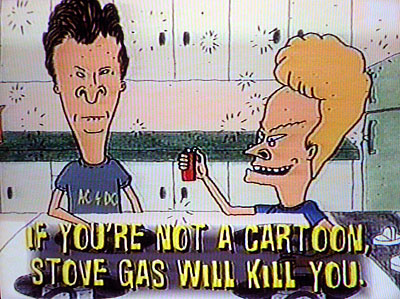You know the “My Talking Stain” commercial for Tide-to-Go that ran during the Super Bowl, and has been widely circulated since?
In it, a guy is interviewing for a job, but while answering questions, a stain on his shirt—it looks like java—sprouts a mouth and starts talking gibberish. It does this so incessantly that it overwhelms the prospective employer’s attention and completely drowns out the interviewee.
This funny ad urges consumers to buy Tide’s portable stain removing pen and not let the messes on their clothes send an unintended message. In fact, the spot’s so good, I only noticed on, maybe, the third viewing, a little bit of disclaimer text, right at the end:
“Coffee stain depicted.”
Huh? Really? You’re serious? You mean, that little splotch of dried Sanka didn’t actually grow lips and tongue, and then spew with the glossolalia?
How did this happen to our media? There was a time in commercials that you could show anything that was legal to broadcast, have a laugh, and call it a day. Look at this ad from the late ’60s, early ’70s for the sexy Volkswagen Karmann Ghia. Applying their classic “anti-advertising advertising” style, VW proves that the car is so underpowered it can’t even drive through a wall-sized sheet of paper strung across the beach.
So, where’s the text telling you, “Do Not Attempt”? Nowadays, you don’t have to recklessly attack a sheet of paper with your ride to get this annoying pop-up. Nor do you have to push prescription drugs, with their endless, often terrifying disclaimers (parodied brilliantly in this E*Trade commercial for “Nozulla”). If an ad has someone, say, stuff their mouths with peanut butter, up comes the tiny type: “Not recommended use,” or something equally banal.
Why? Is it that we live in an age of hair-trigger litigiousness, where advertisers fear consumers will do what they see on the tube, ruin their own lives, and then sue the makers of those products to alleviate their inbredness? Or is it just that corporations believe Americans are as stupid as the rest of the universe does? Or is it both?
 I can’t figure it out. Perhaps the current roots of disclaimer-mania go back to early controversies over Beavis and Butthead (right), in the mid-’90s. The MTV cartoon duo’s behavior was considered so outré then it was denounced in the halls of Congress. This especially when, across the country, parents started blaming the pyromaniacal Beavis for inspiring their children to commit acts of arson . Their outrage resulted in a series of varied disclaimers for the show, most, like this one, rather humorous.
I can’t figure it out. Perhaps the current roots of disclaimer-mania go back to early controversies over Beavis and Butthead (right), in the mid-’90s. The MTV cartoon duo’s behavior was considered so outré then it was denounced in the halls of Congress. This especially when, across the country, parents started blaming the pyromaniacal Beavis for inspiring their children to commit acts of arson . Their outrage resulted in a series of varied disclaimers for the show, most, like this one, rather humorous.
In like manner, it seems the best commercials have fun with this new reality. Perhaps the funniest to-date was Snoop Dogg’s 2006 ad for Orbit gum. Viewers, who saw the rapper, below, rescued from Hell and pardoned for his “dutty mouth,” were pointedly reminded that “Orbit gum will not get you into Heaven.” I’m suing.
DISCLAIMER: Neither Harry Allen, Media Assassin, nor their subsidiaries can be held liable for time or wages lost reading this article while you should have been working.

0 comments ↓
There are no comments yet...Kick things off by filling out the form below.
Leave a Comment